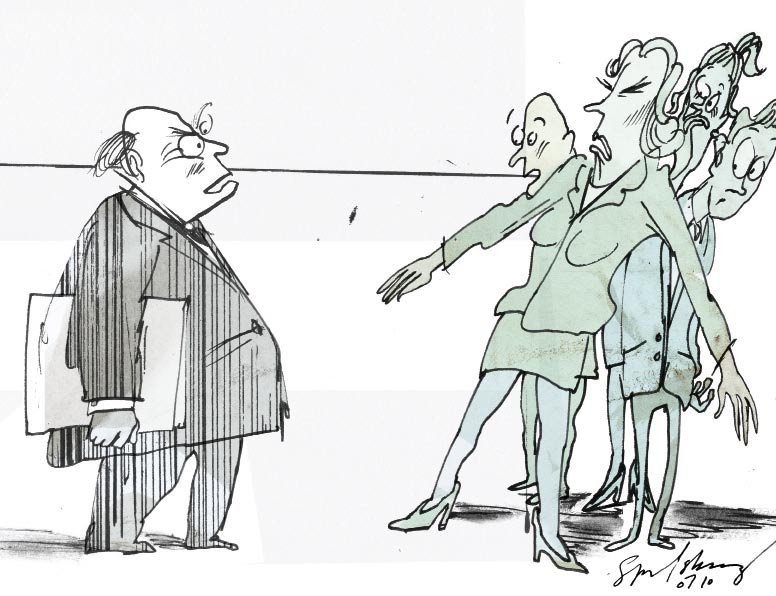One of my favorite CEO's of all time is A.G. Lafley,
who recently stepped down after running Procter & Gamble for a
decade. There are many things I admire about A.G. His modesty and
ability to listen — and I mean really listen, not just pretend —
impressed me when I first met him in 2000, and when I spoke with again
last year I found him unchanged, even after all the praise he has
received.
But perhaps the thing I admire most about A.G. is that, in contrast
to so many other CEOs (and management gurus and authors) he doesn't
pretend for a second that he discovered a new way to manage, or that his
success resulted from any mysterious and complicated methods. One of
his catchphrases is "keep it Sesame Street simple,"
and indeed he spent a lot of time reminding people of simple truths,
like "the consumer is boss." He often exhorted his managers to focus on
what happens at "two moments of truth": when the customer encounters the
P&G product in a retail setting; and when they actually use the
product. Hammering on such old and simple themes, A.G. brought P&G back from
the dark period it was in when he took over in 2000. The norms and
example he set, plus the people he developed, are still enabling P&G
to be a great company.
Cries for the reinvention of management and claims that we have to discard old models are
made by every generation of gurus. But really, the ideas that work
aren't that complicated, and most of what is called new is really the
same old wine in relabeled bottles. If you want to read a great book on
this point, check out Robert Eccles' and Nitin Nohria's Beyond The Hype.
When I read it for the first time, I realized that a big reason every
generation thinks that its solutions are new is because it thinks its challenges are
brand new. People can't quite bring themselves to believe that managers
of the past faced remarkably similar problems, found frustration and
satisfaction in similar sources, and came up with similar solutions.
Just as teenagers discover sex and can't imagine that the fundamentals
were the same for their parents, managers are convinced they are
encountering forces and feelings that haven't been seen before. And
management theorists do little to disabuse them of that notion.
To this point, some years back when Jeff Pfeffer and I were writing our book on evidence-based management, I wrote Stanford's James March (arguably
the most respected living organizational theorist) to ask him for
examples of truly breakthrough ideas. His response was "Most claims of
originality are testimony to ignorance and most claims of magic are
testimonial to hubris." I promptly repurposed this into Sutton's law:
"If you think that you have a new idea, you are wrong. Someone probably
already had it. This idea isn't original either; I stole it from
someone else."
I am not denying that bosses work in different environments these
days — the computer revolution and global nature of business have
reshaped organizations, for example — but the fundamentals of being a
good boss have changed a lot less than people claim. While writing Good Boss, Bad Boss I
had occasion to compare studies conducted in every decade from 1940's
through the 2000's, and they yielded very similar advice. Even studying
pre-industrial people, anthropologists have concluded that the best
leaders were competent, caring, and benevolent — and leaders who failed
in any of these areas put their people at risk and had a hard time
getting or keeping leadership positions. Research on the modern
workplace, too, leads me to conclude that the best bosses strike a
healthy balance between promoting performance and protecting their
people's dignity and well-being. I am using different language, but it
seems to me that what constitutes a decent boss hasn't really changed
much in thousands of years.
Unfortunately, the formula seems to be easier to state than to put into
action. Another consistent finding over time is that, if you're a
typical employee, your immediate supervisor is the most stressful part
of your job.
The lesson from all this is that old, proven, simple, and obvious ideas
on how to manage may be dull — and some may be outmoded now and then —
but they are your best hope if you want to be a good boss.
But now, let me complicate my message just a bit, by recalling my own reaction to Jim Collins' blockbuster Good to Great (read more here).
The hallmarks of good management and leadership Collins identified were
consistent with much prior research — much of it more rigorous than his
own (and he mentioned almost none of it). But there's something so
compelling about his telling of the story, and I think that has
everything to do with his own sense of discovery. Maybe, as with
teenagers discovering sex, management theorists — and managers — bring
more passion to the experience when they arrive at the basics
themselves.
P.S. This post represents a persistent theme in my writing, especially with Jeff Pfeffer, which I revisited and developed a bit more for the list 12 Things Good Bosses Believe that I am rolling out over at HBR, where it first appeared as What Every New Generation Of Bosses Have To Learn. Indeed, if you look at the big business story this week, that Mark Hurd was canned by HP for behavior connected to a sexual harassment claim, I don't think that we need any newfangled theories to explain his behavior — a Yiddish expression that has been around for hundreds of year captures it all.
